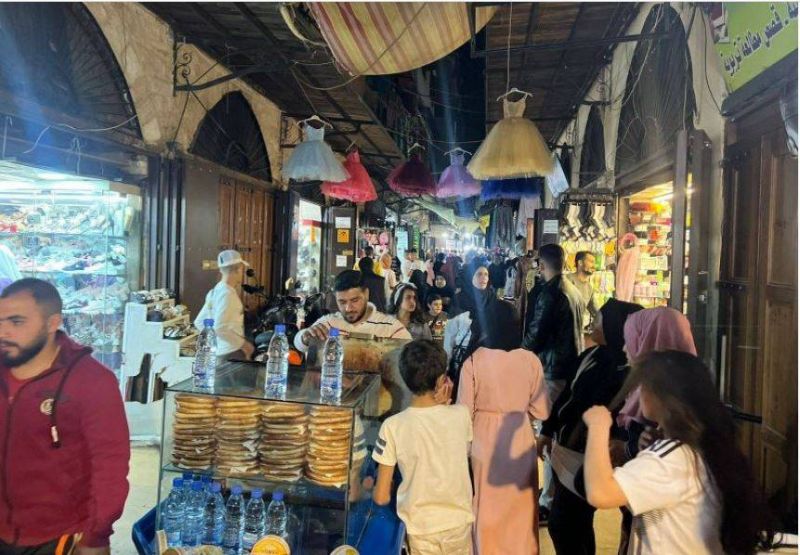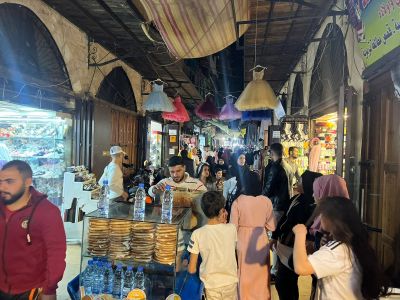
The souks of Tripoli. (Credit: Souhayb Jawhar/OLJ)
As Eid al-Fitr approaches, the mood in Tripoli is not festive. Just a few days after the sinking of a smuggler boat full of would-be migrants off the coast of the city on Saturday night — of whom only 45 were rescued, six confirmed dead according to the army and more than thirty missing — the streets of the large northern city are in mourning, and its inhabitants, already exhausted by the acute economic crisis that has hit them even harder than the rest of the Lebanese, do not have the heart to celebrate.
Adding to this melancholy atmosphere is the fact that the efforts of the army's naval forces, assisted by the Civil Defense's sea rescue unit, have still not been able to locate the rest of the victims of this tragedy. Relatives of the missing hold regular demonstrations to demand that light be shed on the circumstances of the sinking of the boat that was believed to be carrying nearly 85 migrants. On Thursday night, they gathered in front of the palace of Prime Minister Najib Mikati in the Mina area.
In Bab al-Tabbaneh, a working class neighborhood where many of the victims of Saturday's shipwreck came from, distress and death are everywhere.
In the house of the Hamoui, a family of six of whom four members drowned while two children survived, Fatima, the 50-year-old sister of the father of the family, laments.
“Festivities have no place in our home until the circumstances of my brother's disappearance are clarified," she sobs. “Some well-meaning people have sent us holiday desserts and clothes for the surviving children, but none of that matters. My nieces don't sleep at night, they have nightmares every time they close their eyes. What they need is not to feel the holiday, but to have access to psychological treatment to come to grips with their life without a father or mother."
Fatima can't believe that her brother Mohammad didn't tell anyone about his plan, that he took his entire family on this death ship — two wives, one pregnant with twins, two daughters and a son. She tells the sad story of her brother, victim of the vertiginous rise in prices that forced him to take his children out of school because he could not afford the cost of transportation. The only motive for such a desperate act, according to her, is the desire to "get out of hell." Mohammad couldn't even put food on the table anymore, having lost his scrap metal store in the city. His last job as a garbage collector did not allow him to support his family.
"My children are celebrating in Paradise"
In front of his house, whose facade is covered with black hangings, Mahmoud Dandachi, who lost his three children in the shipwreck, is surrounded by family members and friends, but he is inconsolable.
"My children are spending the holiday in Paradise, while I remain in this hell presided over by (President of the Republic) Michel Aoun and (Prime Minister) Nagib Mikati," he says.
The father of the family was able to bury some of his family members, while others remain lost at sea.
"After the holiday, it will be time for the elections, the opportunity to hold those responsible accountable," says the young man who says he no longer believes in anyone.
"What we have lost is enough, nothing will compensate for our loss," he says, bitter and disillusioned. He is convinced that the truth will not be revealed about this incident, that it will be forgotten like many others before it, as if nothing had happened.
Insecurity scares off customers
Even the magnitude of this tragedy at sea has not made Tripoli forget the economic crisis, aggravated by the state of insecurity that the city lives following the shipwreck and clashes with the army on Sunday, on top of which, a dispute over a poster representing a candidate in the May 15 elections resulted in a man being killed last weekend. For traders in the city, generally known for its festive atmosphere in the run-up to Fitr, this is the coup de grace.
Issam Jarad, a clothing merchant in the city's old souks, says that business has been almost non-existent since the strike that followed the tragedy.
"Usually, people from neighboring cazas such as Minieh, Dennieh or Akkar, come to shop with us, but this time, they were deterred by the risk of clashes," he said. The shopkeeper notes that security incidents against the backdrop of political quarrels and the economic crisis have multiplied since the beginning of Ramadan, which drives customers away.
"I accumulate losses since I ordered local and Turkish goods that I can not sell," he laments, blaming "the government that promised us a prosperous season that we have not seen.”
In the popular souk of pastry shops, usually very busy in times of celebration, the atmosphere is not much more festive. Abu Mohammad Charafeddine runs one of the most famous pastry shops in the area.
"We bought a quantity of raw materials that is usually enough to satisfy the orders of dozens of our regular customers. We are a very famous spot, especially for mamoul during the Eid," he says, but “the insecurity in the city has emptied our streets of customers, which affects our sales, and will force us to adjust the salaries of our employees downward."
This article was originally published in French in L'Orient-Le Jour.
